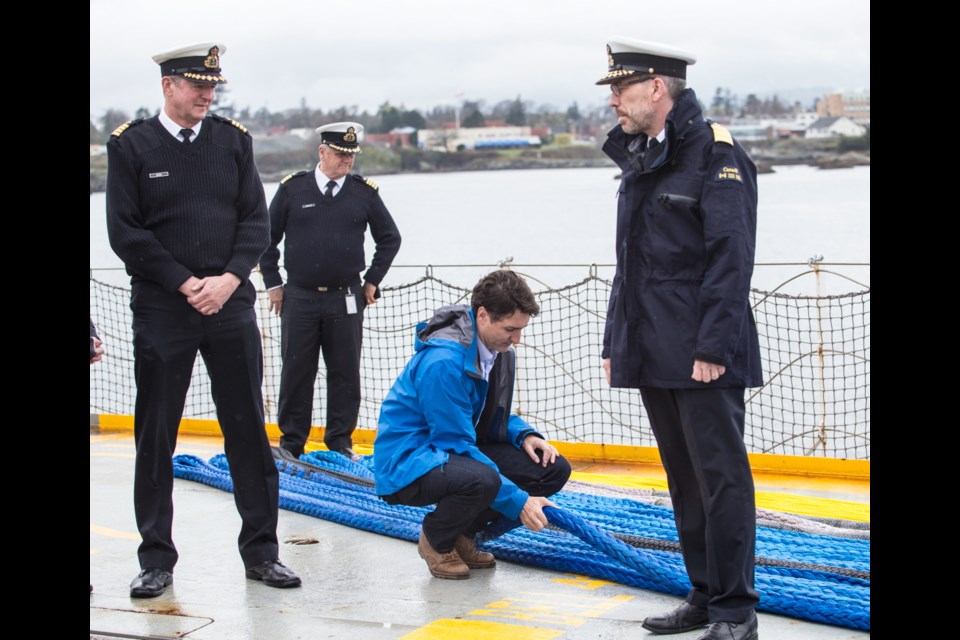 Had Justin Trudeau arrived in Victoria a couple of hours earlier Thursday, he could have watched the empty oil tanker Nave Pyxis slide past the Victoria waterfront, bound for Singapore.
Had Justin Trudeau arrived in Victoria a couple of hours earlier Thursday, he could have watched the empty oil tanker Nave Pyxis slide past the Victoria waterfront, bound for Singapore.
Another oil tanker, the Alaskan Frontier, was docked across the strait at Port Angeles. Yet another, the Polar Enterprise, was anchored off Anacortes, while the crude carrier RS Aurora was just up the coast at Cherry Point, near Bellingham.
We already have plenty of oil tankers, roughly one a day — most from Alaska, some from Russia and elsewhere — gliding past our front door on their way to Washington state’s five refineries, four of which are within 60 kilometres of Greater Victoria.
That’s in addition to the 30 to 50 tankers that fill up at Kinder Morgan’s Burnaby terminal each year.
To proponents of Kinder Morgan’s expansion of the Trans Mountain pipeline, those numbers prove how safe it is to ship Alberta’s oil from B.C.’s coast.
To the scores of passionate, inflatable-whale-waving protesters who railed at the prime minister outside the Canadian Coast Guard station in James Bay, though, it’s an ever-increasing risk, a ticking time bomb.
That’s Trudeau’s challenge now: to persuade British Columbia that shipping more oil is safe. It’s that issue, much more than the pipeline itself or the broader question of climate change, that presents the political hurdle he must clear.
He deemed it important enough to merit Thursday’s appearance in James Bay, a flying visit on a day that he began with an 8 a.m. breakfast speech in Quebec City.
He came to Victoria and Vancouver to tout Ottawa’s 10-year, $1.5-billion Ocean Protection Plan, and to hammer home — again and again — the message that the federal government’s policy is one that rejects the politics of polarization.
It’s not a question of pitting environmental interests against economic ones, he argued, but of doing a balancing act that includes carbon pricing, protection of the oceans and approval of the Trans Mountain expansion.
“We need to build a strong economy and protect the environment at the same time.”
Trudeau kept banging away. The protesters in Victoria might hate the pipeline, but they like the carbon tax and environmental safeguards, he said. The Albertans he will see in Fort McMurray today might dislike the carbon tax, but they love the pipeline decision.
“What we’re focusing on doing is not trying to please everyone. What we’re trying to focus on is doing the right thing for our communities, for our country, for our future.”
Victoria New Democrat MP Murray Rankin was unimpressed. “The prime minister said nothing to assure Canadians that Kinder Morgan would not have disastrous consequences to the environment. He continues to use trivial rhetoric about Kinder Morgan aligning with the national interest and it’s simply not true.”
Politically, Trudeau appears to have more to lose than he has to gain by backing the pipeline expansion. He risks alienating the B.C. voters who in 2015 elected 17 Liberal MPs, almost all of them in the Lower Mainland, where in February an Angus Reid Institute poll showed opposition to the pipeline is highest.
On the flip side, the prime minister’s support for the pipeline might be popular in Alberta, but it still won’t win him any seats there. He could deliver $100-a-barrel oil, deep-fried salvation and Free Beer Fridays and still get shut out in Wild Rose Country in next year’s federal election. He’s a Liberal and a Trudeau. Two strikes and you’re out.
So, yes, Trudeau really needs to get British Columbians on side, which is why he showed up Thursday. He toured the Coast Guard ship Sir Wilfrid Laurier, pausing for a mildly awkward photo op in which, while standing in a chilly rain, the PM did a better job than three other politicians — Defence Minister Harjit Sajjan, Public Services Minister Carla Qualtrough and North Vancouver MP Jonathan Wilkinson — at appearing fascinated while being shown what rope looks like. Then, after pitching his pipeline policy and fielding a few questions, he flew off to do it all over again in Vancouver.
Such efforts can backfire. British Columbians don’t always like it when politicians fly in from Back East to tell us what to think. In 2013, when the Harper Conservatives were trying to push through the Northern Gateway pipeline project, it didn’t help Ottawa’s cause when a Victoria-based oil-skimming vessel got hung up on a sandbar en route to a Vancouver news conference at which Natural Resources Minister Joe Oliver, who hails from Toronto, tried to persuade West Coasters that their safety fears were unfounded.
Trudeau, a former Vancouver school teacher and son of a Vancouver-raised mother, played on his regional roots: “I do love Ottawa but any chance I can get to leave the political bubble and visit the West Coast is a good day in my books. This place is home, and I know we all have a deep connection to the beautiful Pacific around here.”
And he kept stressing the environmental angle, portraying the Ocean Protection Program as a way to add safeguards to an already-existing oil-shipping industry.
“The Trans Mountain Pipeline has been in place since the Fifties and has been exporting diluted bitumen for three decades now. … This is not something new.”
Perhaps, but neither is British Columbians’ passion for their coast. Trudeau knows those feelings, more than any other element of the pipeline debate, are key in B.C.e



